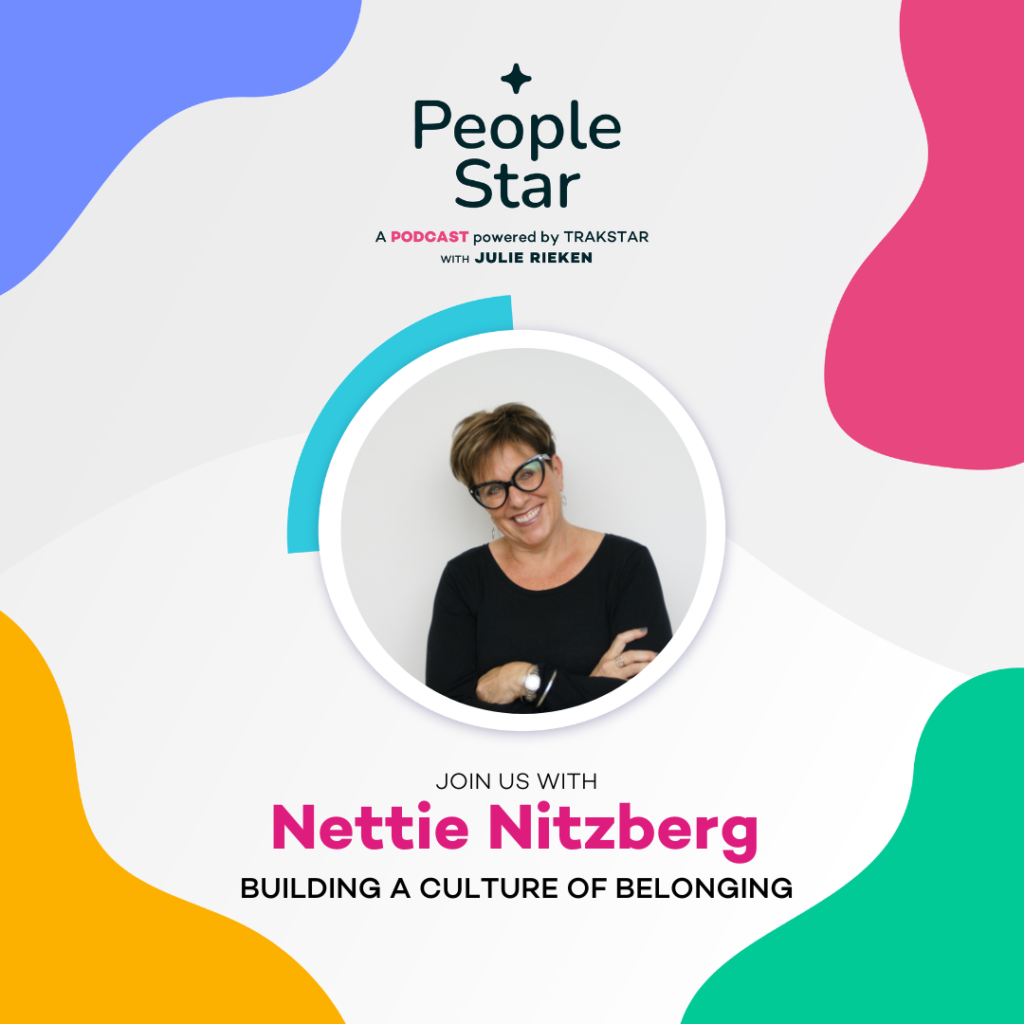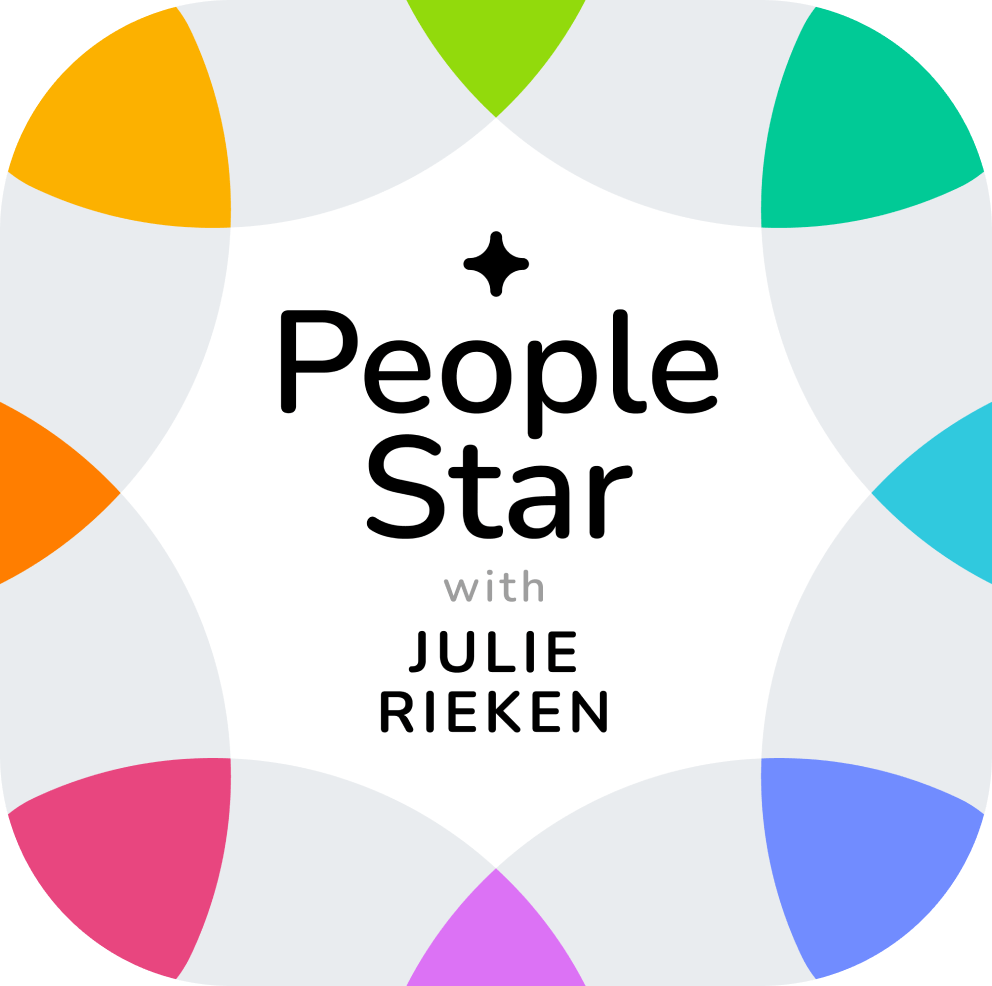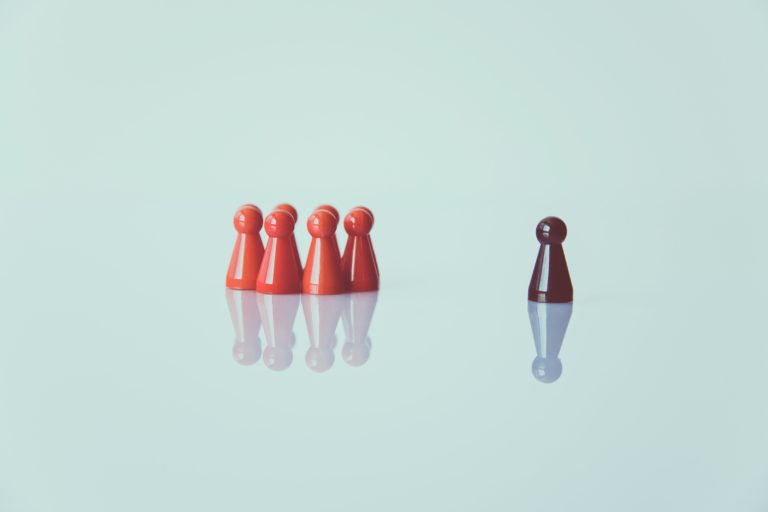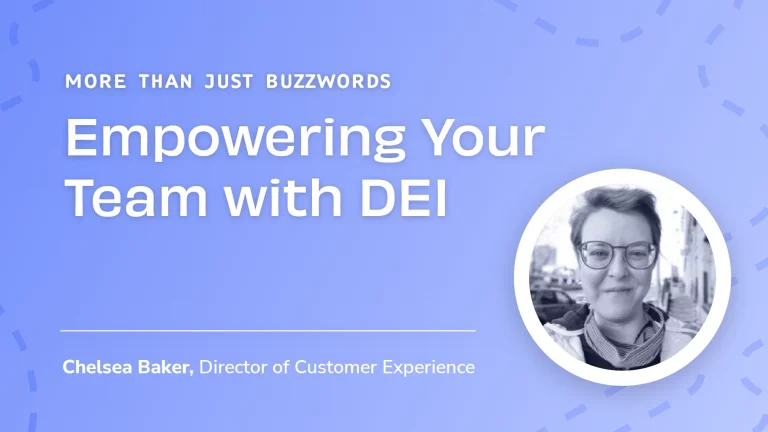PeopleStar_Nettie Nitzberg: this mp3 audio file was automatically transcribed by Sonix with the best speech-to-text algorithms. This transcript may contain errors.
PeopleStar Intro/Outro:
Welcome to the PeopleStar Podcast. We deliver leadership perspectives from industry experts on their people, architecture, routines, and culture as they solve HR's newest challenges. And now your host, Julie Rieken.
Julie Rieken:
Hello podcast listeners. Julie Rieken, host of PeopleStar Podcast. Today, it's going to be a really interesting conversation because I have someone here, Nettie Nitzberg. She is at Saterman Connect, we'll introduce herself, but we're going to talk a little bit about something we haven't covered as much in depth on our podcast, and I think it's going to be fascinating for our listeners. So really excited. Nettie, welcome to PeopleStar podcast!
Nettie Nitzberg:
Julie, thank you so much for having me here. It's a pleasure!
Julie Rieken:
So Nettie, tell us a little bit, before we get into the meat of our conversation. Tell us a little bit about Saterman Connect. And you mentioned that you're an accidental entrepreneur and that just made me light up, I love that. Can you just tell us how did you get here? And let's start with that.
Nettie Nitzberg:
Okay, fantastic! Yeah, it's quite a story. I always thought that after I went to graduate school for a master's degree in Human Resource Development with a specialty in instructional design that I'd be moving in the corporate world and up the corporate ladder. And at this point in my career, be a Chief People Officer, learning the CHR officer. So really deep at the, the C level within the organization and my trajectory just did not work that way. I started off as a consultant with Accenture, which was an amazing background and grounding, to be a consultant as well as in the learning and development field. I then went to work for a rapidly growing startup and here I was a director, like in my around 30 years old, managing a team of learning and development professionals. And then as what happens with many women, I actually got pregnant and I had a baby, and I went on maternity leave and things with the company just didn't meet my personal needs. So we also ended up, my, my husband got a new job, we ended up moving or living in the D.C. area. We ended up moving to Buffalo, New York, which is actually around the area where I grew up. But we were in Buffalo and I could not find a job. And I had, at that time two small infants, I wanted to work, I needed to work, I loved doing what I was doing. And I hung up a shingle and here I was now a consultant/entrepreneur. And it was crazy. I mean, it was I was doing what I love to do. And a couple of years into living in Buffalo, we moved again. And now I'm in Atlanta, Georgia, and I'm like, I don't know anybody here. I have these two small children and where do I even look for a job? So again, I hung up my shingle and I was very lucky because at the time companies were hiring consultants, they just needed help. And I reached out and I got my first project with BellSouth, it's kind of crazy to talk about BellSouth. And then from there I literally grew my practice for 14 years being in the Atlanta area, had all different kind of clients, I had a great network, I tended, instead of to be an external consultant, go in to companies and be their learning and leadership person, helping to design and develop and launch internal programs. And I did that until I left Atlanta, then moved further up the East Coast, hung my shingle again in Boston, took a while, got my, grounded, ended up getting local clients, and then I just was tired. I thought, okay, I'm done doing this consulting thing, I'm doing it by myself. And I looked for a job and I went to work for 18 months for a very rapid startup. The company is called Toast, many people have heard of it, if you go to a restaurant, your receipt a lot of times is through, through Toast POS system. They were 900 when I started, they were 1800 people when I left at 18 months, I built a L&D department. We onboarded 100 to 150 people a month. It was crazy, it was amazing, a lot of opportunity to work with millennials, and then I was like, whoa, okay, this is enough. My time inside, it was a fascinating opportunity to be back inside, working with a technology company, working with all these bright young people coming in, understanding what millennials need. And then I was like, okay, I still like consulting, I still want to do something. And that's when I reached out to Josh Suderman, who is one of my managing, one of our managing partners. He and his husband, Michael Seidemann, we've known each other for 20 years, we were business colleagues, we were friends and about two years ago, I joined Saterman Connect as the third managing partner and I am currently now the Chief Learning and Leadership Officer. So I'm with a group of people which I love. We're working with amazing companies in the learning and development, as well as the diversity, equity and inclusion space helping with culture. And my accidental entrepreneurship has just really led me to do things I never think I ever would have done. And I love, love, love what I'm doing with Saterman Connect, so that's my journey.
Julie Rieken:
I love it. What a cool story. So there's two things. Number one, I want to high-five working moms.
Nettie Nitzberg:
Yeah! Need to.
Julie Rieken:
Right? Seriously and how, and how that journey can sometimes shift our perspective on our work trajectory. It changed mine, and it sounds like it changed yours, too, so.
Nettie Nitzberg:
Absolutely. And with the pandemic, it changed so many other women. Many of us have become entrepreneurs or have looked at our careers in many, many different ways, which, I feel like I didn't have that choice many years ago. And Julie, you may not have as well, but now with companies in a hybrid or remote work environment, I think companies are being more equitable in how they are running their businesses in terms of all the needs of their employees.
Julie Rieken:
Which leads perfectly, Nettie, into our next piece. So we were talking about Saterman Connect and why organizations come to you, and you mentioned two things that, and now I see where, you mentioned two reasons they may work with you, well, and I'm sure there's more than two, but we talk about two main ones. Well, we talked about two. Let's not even say they're the main ones. We talked about two, rapidly growing companies that are defining their culture and hiring and onboarding. And now I see where your Toast background really comes branding. Wow!
Nettie Nitzberg:
Yeah!
Julie Rieken:
And DE&I, culture and belonging. And those are two things that you have unique expertise in. So those are some of the things that we were going to talk about today. And I kind of narrowed in on the DE&I piece because this is something that we're all witnessing. So do you mind, can we dig into that on organizations that come to you for this? And how do you help them?
Nettie Nitzberg:
Yeah, I'd love to. It's a, it's been a really interesting journey for me because, at Toast I was responsible for some DE&I work, but at Saterman Connect I actually got certified as a DEI practitioner through Cornell. Josh was already in that area, I had done a lot of work with employee resource groups, which is where with many companies, either the DNI Council or resource groups are many times their foray into diversity, equity, inclusion and belonging within their organization. And then there's many companies that are coming to us like these rapidly growing startups or fast-growing organizations that are like, we are hiring Gen Zs, we are hiring millennials, what is most important to them is the work that we're doing around diversity, equity, inclusion and belonging or around governance with ESG that many companies are working with environmental governance area, social responsibility, social impact, and, or something happened around BlackLivesMatter and George Floyd and they had to say something. And the HR people in the company don't, aren't the experts, they're trying their best, but they really need that help and support that we've been able to offer in terms of helping leaders to communicate messages or understanding the importance of this. I think, Julie, when you and I are preparing, I mentioned that we had some global companies that we work with and in Europe, many of these CEOs, when the whole thing with George Floyd happened, we're like, I don't understand why you have to say anything, you know, we're a company based in Europe. That's not an issue that we have over here, where these HR leaders in the US were like, no, we have to say something, this is what's going on. And just trying to explain that was very difficult so that in many companies kind of led to where they are today in terms of their, and we like to call it diversity, equity, inclusion and belonging journey. And where we're stepping in is really helping managers to be inclusive leaders, creating a culture of inclusion and belonging. How do we do that, especially if we have remote people, people aren't coming into the office. We have to figure out how to do that in that hybrid environment. But also, what am I saying that I shouldn't be saying. There, you may be saying something that's a microaggression towards somebody or they, you overhear a conversation and you're, don't even understand anything in the context of what is being said. But you're making assumptions or there's bias that's going into that. So our services range from coaching senior leaders to bringing in academy and programs that we have around the power of your own language and how that impacts the people around you, impacts your culture, impacts how you work with customers and clients. So there's all different things around there that we can dive into based on what you want to talk about.
Julie Rieken:
You know, I'm really interested in this idea of, there's maybe two trajectories here that I'm interested in following with you. Number one, this seems like a perfect blend of your learning and development background into now creating programs that help teach things, like how when you think about what to teach and how to teach, how do you think, how should we be thinking about this as leaders? What do we need to think about as leaders in terms of sharing information and training our people on the things that you've mentioned? What if there's context in the conversation? What if there's microaggressions? What are the things we say and don't say? How do we develop programs for this? What do we what should we be thinking about?
Nettie Nitzberg:
You're right. Both my skill sets. So I'm an instructional designer at heart, which means I design and develop adult learning programs. And when we decided to build out what's called our Power of Language Academy as an instructional designer who had some knowledge of this space, I worked with some subject matter experts to really understand what are some of the core concepts that we need to make people aware of, number one. Help them to understand why this is happening, why this is important, and then teaching them skill sets to actually be able to converse, to think about being and that DEI&B space so our program ended up being, is consisting of several introductory modules. The first one that I think, everybody, this is from, this is one of the things we also share with the leaders is that we could have, we love to use this example two white cisgender, which is heterosexual males, say in their forties or fifties in the same room, and if we looked at them, we would not think about them being diverse, but they're diverse because people have invisible dimensions of their diversity that when you look at them, you might not know that they have a child that's autistic, you might not know that they lost a partner and they're remarried, you may not know that their extended family lives with them. So all these things that are inside somebody makes them very unique and we call them the invisible dimensions of diversity. So if we think about that, that is where it becomes very interesting to help understand what those are and then also the power of your language once you understand what people's dimensions are. Are you saying something to a gay person that's a microaggression towards them being gay? You may, just off the cuff make a comment and that person is thinking about what you said or with people of different cultures or different religions, the language that you use and not thinking about it and just saying things that maybe are part of a bias that you have or you're stereotyping somebody, really need to be, you need to create an awareness around that. And that's when we introduce all these different types of microaggressions, tokenism, religiosity, meritocracy, bisexuality, you know, all these different things that are happening in the world today, especially as people are coming out fluid or there's transgender, we have mixed races, we have different people from different countries coming to work with us. So it's really, really important to understand that. But then what is also really important is when you hear a microaggression or you have realized you've said something that's inappropriate, how do you talk about it? This is where everybody just is like, oh my God, I'm just going to forget what I said or I'm going to just walk away and say, I'm sorry, but there is a way to talk about that. There's a way to interrupt somebody that's saying something or to ask them more questions to share further. So those are just some of the components that we cover in our Power of Language Academy and that are helpful to leaders, employees, it doesn't matter if you're an individual contributor or manager. It doesn't matter if you're new in your career or you're, been in your career for 25 years. The power of our own language can really have such a negative impact. And it's many times we're not, we're not even thinking about their, we're unaware of it and what it's doing. And once we become more aware, it's just really amazing how your eyes open and you notice things, social media, magazine pictures. And it's just pretty incredible that this awareness and connection to understanding the impact that it has, how it opens people's eyes and changes a culture in many of the companies that we work with.
Julie Rieken:
So there's a couple of things here that I want to just, I love that you talked about. Number one, creating awareness. Then the why, why it's important or how it fits, and then teaching skill sets. And you've discussed that and I love this phrase, the invisible dimensions of diversity, because it's true. So many people, we're all different no matter what that what we bring. And I'm wondering maybe next steps for HR people and I guess next steps for me, like, I'm really connecting an easy dot here. The idea is these are tough conversations and you mentioned that you are DE&I and maybe B, did you have the belonging.
Nettie Nitzberg:
Yeah. Belonging for the …
Julie Rieken:
Through Cornell certified. These are conversations that are important and having someone who's thought through how to have them is maybe a good step for leaders to think about how to bring this to their organizations. You just talk a little bit about that, about about why why some of this background is so important.
Nettie Nitzberg:
I think there are so many opportunities to learn about this. There's some great TED talks. There's one in particular that we've been talking a lot about over the last week, and it's called The Danger of a Single Story. And I never pronounce her name right, and I'm going to apologize right away, but it's Chimamanda Ngozi Adichie, and I know I just did a terrible job doing that. She's a Nigerian novelist, and many of us over the last few years have probably seen her novels. The first one that came out was Americanah, and she does the most brilliant 18 minute TEDx talk on how the impact the single story can have on somebody. The first she was brought up, as I mentioned, in Nigeria, her parents were educators, for the most part she was brought up at a middle or upper middle class family. But being in Nigeria with the war that is going on and everything that's going on in their country, things happen, she was very lucky to come over to the United States to be educated, and her roommate in college had never met somebody from Nigeria. And the first thing she says to her is, I'm so surprised your English is so good. And she's like, well, English is the language of Nigeria, so like it should be. So here was the context that this woman was thinking she was going to speak in another language, excuse me, listening to African music, where she asked for what's your favorite music? I think she's like Mariah Carey, that she was going to be wearing some crazy outfit or walking around naked. I mean, just these crazy things that we have when we don't know the context or the invisible dimensions of somebody's diversity. So that's just one example. And I suggest to the audience, and it's just, she is just beautiful, articulate, And so many of her stories hit home for all of us, helping us to recognize some of our own bias, some of the stereotypes that we have of other people, and not realizing that we need to ask questions to find out more.
Julie Rieken:
I love that. So, Nettie, this has been great because I'm just thinking about all of the organizations that I know, the HR people that we know, and how these conversations are so important, and how we can empower and educate our people to understand more. And so I'd like to wrap by making sure that we will put Saterman Connect in our podcast notes. I'd love to have that the TED Talk, also both of those things. Yeah, you should include that because I think listeners will want to want to watch that, I know that I do. And so this is super amazing and I appreciate the work that you're doing not only around DEI&B, but also just helping organizations that are rapidly growing and including these learnings in the work that you're doing. So it's important work and this has been fascinating. Thank you!
Nettie Nitzberg:
Thank you so much. It's been a pleasure speaking to you. And check out SatermanConnect.com, our Power of Language Academy, and there's so many TEDTalks out there and so many good resources. So just Google DEI&B and you'll find a lot of information. So, Julie, thank you.
Julie Rieken:
Thanks, Nettie.
PeopleStar Intro/Outro:
Thanks for listening to the PeopleStar Podcast. For the show notes, transcript, resources, and more ways to get a seat at the table, visit us at TrakStar.com/Podcast.
Sonix has many features that you’d love including automatic transcription software, automated translation, collaboration tools, secure transcription and file storage, and easily transcribe your Zoom meetings. Try Sonix for free today.




